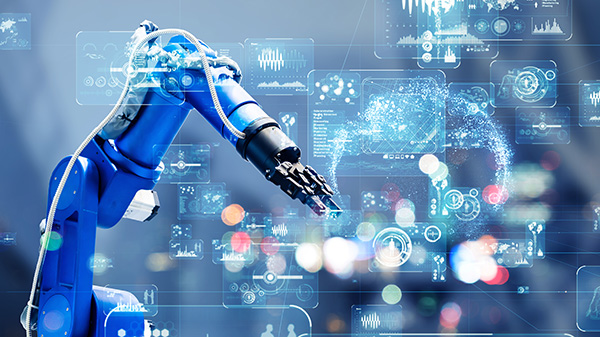The world of manufacturing has reshaped itself rapidly in the past few decades.

By Brent Lazarenko, Head of Technology & Innovation and Chief AI Officer at InterVision
It’s no longer the simplified industrialist worlds of Henry Ford, Samuel Slater, or Frances Cabot Lowell. Instead, new innovations in technology such as the cloud, 3D printing, robotics, and Artificial Intelligence (AI) have driven new approaches to efficiency on the manufacturing floor and streamlining the supply chain process. Now with changes to global tariffs in the news, the manufacturing world is expected to reshape itself further.
Modern-day manufacturers face a growing list of challenges: higher production costs, equipment failure and maintenance, and bottlenecks in the supply chain to name a few. Some of these challenges are not necessarily new, but new in their nuances. As a result, companies are searching for innovative ways to cut unnecessary costs, decrease downtime, and improve supply chain logistics. That’s where the use of AI can offer potential for a competitive edge.
The use of AI in manufacturing is already prevalent for many organizations. According to an article in the American Supply Association, “The Manufacturers Alliance Foundation reports that 93 percent of manufacturers have started new AI projects over the past year, and 6 percent are preparing to launch their own initiatives. AI is expected to enhance productivity, throughput, and quality, leading to substantial revenue growth.”
Here, the growing use of AI can be an accelerator for process improvements and an informative tool for powering manufacturing efficiency, especially as it relates to making calculated investments in equipment purchases, hiring personnel, and other related business costs. The more predictable organizations can be in this area, the more stability they will experience, which drives up employee satisfaction and retention. Plus, this stability can have positive impacts on reducing the need for layoffs during economic times of turbulence.
According to this report from PwC, there are four types of AI that are relevant to manufacturing today: 1) Assisted Intelligence, 2) Augmented Intelligence, 3) Automation, and 4) Autonomous Intelligence.
Assisted Intelligence describes systems that assist in human tasks and interactions, usually customized for specialized roles, whereas Augmented Intelligence denotes systems that continuously learn from human-performed tasks and make suggestions for augmentation and decision-making. Automation, on the other hand, describes the AI-enabled automating of reoccurring tasks and decision chains, which allows humans to focus their efforts on other items. Lastly, Autonomous Intelligence notes systems that can adapt and automate without the need for human assistance.
Of these four types of AI, there are a few core areas where they could be useful to the manufacturing industry: production, testing, equipment maintenance, supply chain improvements, and engineering. Let’s explore these in more detail.
AI can help during the product design process, even inserting a degree of personalization into mass-produced products. Algorithms can analyze large quantities of data to synthesize recommendations for design improvements and innovative new approaches. With the ability to insert this personalization, AI has the potential to cater to the specific nuances of each customer, which could have huge impacts on increasing consumer demand.
Another use for AI is to help identify defects along the production line, which reduces waste and maintains brand quality. During the production process, improvements using AI can automate and augment the existing labor force to drive up productivity. When companies introduce automation into their production process, it can accelerate output while maintaining consistency and reducing human errors.
AI can be incredibly helpful in easing some of the tedious and burdensome elements of product testing for quality assurance, testing for systems and equipment maintenance, and testing for workplace safety hazards. Here, using AI to introduce predictive maintenance minimizes downtime through better planning when it comes to testing and fixing equipment.
When AI can anticipate machine failures, it means that employees can be ready for an event before it happens and take steps to mitigate the impacts on the production process. It also can help save on repair costs. Malfunctions can be stopped before they harm people. Equipment can be outfitted to be more sustainable and effective, which boosts productivity.
All of these testing and maintenance improvements through AI can lead to better workplace safety. Additionally, AI can help with compliance and regulatory auditing readiness. It can preemptively perform testing to audit systems ahead of an official regulatory auditor’s visit. This helps companies identify necessary improvements beforehand so that passing audits is much easier.
Optimizing the supply chain has long been a headache for many manufacturers. From gathering the parts needed for the production line to getting the assembled products packaged to sending products to distributors, it all takes a lot of careful logistical coordination. Engineering for streamlined efficiency is tedious work, but it is also an area where the use of AI can be leveraged to speed up analytics and increase agility when hiccups occur.
With the help of AI analyzing existing data, businesses can better forecast demand, predict fluctuations in inventory, and lower storage costs. This allows businesses to keep up with customer demand more effectively, boosting overall profitability.
By improving the supply chain and engineering stages of the manufacturing journey—whether design or delivery—companies can harness insights to make actionable decisions, resulting in increased business stability in an uncertain world.
The future of manufacturing depends upon establishing reliable systems for continuous optimization and readiness for logistics, supply chain, and consumer demand fluctuations. AI can be an enabler to help establish this stability in an industry that has been plagued for decades by unpredictability and global logistical challenges.
In other words, AI has the potential to inject a little peace of mind into a business sector known for uncertainty, which is much needed in today’s ever-evolving landscape. Having an element of increased stability in manufacturing production, testing, and supply chain efficiency will, in turn, have downstream effects on employee retention, satisfaction, and cultural alignment. It will also bolster investor confidence and contribute to better business agility in the long term.

About the Author:
Brent Lazarenko, Head of Technology & Innovation and Chief AI Officer at InterVision, brings extensive experience in leading digital transformation initiatives and developing innovative software platforms and AI solutions. At InterVision, Brent drives strategic partnerships and oversees the creation of advanced Application & Data Modernization and AI products, enabling organizations to achieve greater efficiency and actionable insights.
Read more from the Author:
How Generative AI is Transforming Modern Manufacturing | Manufacturing Business Technology, February 28, 2025
Scott Ellyson, CEO of East West Manufacturing, brings decades of global manufacturing and supply chain leadership to the conversation. In this episode, he shares practical insights on scaling operations, navigating complexity, and building resilient manufacturing networks in an increasingly connected world.